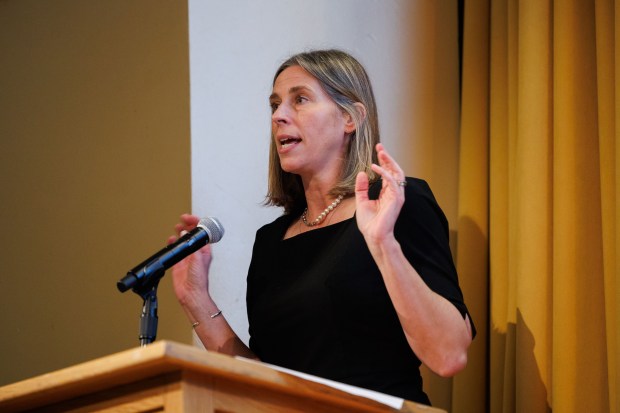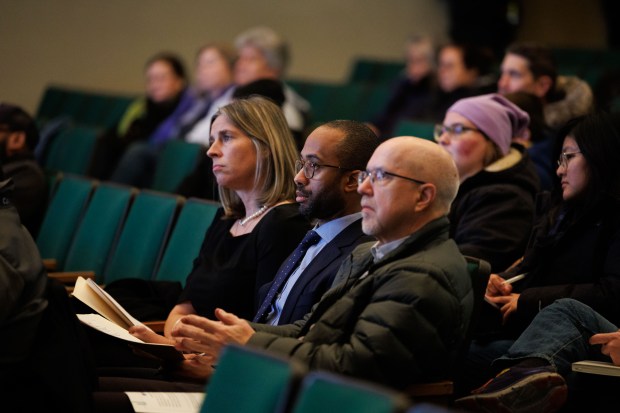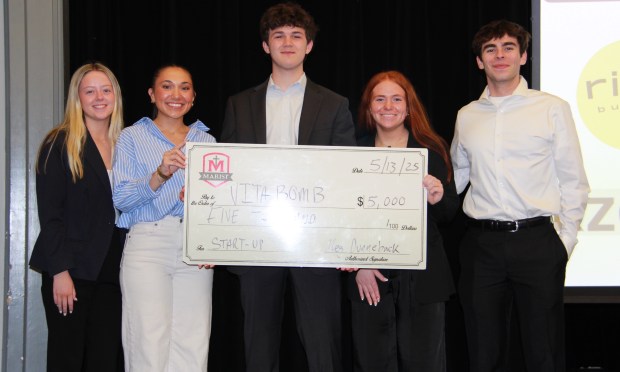Leaders of the city’s Police Department and its oversight bodies gathered on the Northwest Side Thursday to unveil the agencies’ respective goals for 2025, with Chicago police Superintendent Larry Snelling promising a focus on fostering community partnerships, officer wellness and improving compliance with the federal consent decree.
“We have to make sure that our officers are well — well of mind, mentally, physically — so that we are putting the best possible product out into the community,” Snelling said. “If we are not treating our officers well, we can not expect our officers to treat others well. I’ve heard it said many times before, ‘Hurt people hurt people.’”
The head of the Civilian Office of Police Accountability, Andrea Kersten, said the agency will take a broader look at police complaints next year by using aggregate data to identify potential “patterns and practices of misconduct.”
Kyle Cooper, president of the Chicago Police Board, meanwhile, announced plans to revise the rules and regulations governing CPD officers — a set of bylaws not updated in years.
The meeting, held in the chilly auditorium of the Irish American Heritage Center in the Irving Park neighborhood, was attended by roughly 75 people.
Snelling laid out six objectives for 2025, several of which have been top-of-mind for years: Ensure officers have strong foundations in constitutional and impartial policing; Make progress in the long-awaited workforce allocation study; Build and foster community partnerships; Encourage and support officer wellness; Provide resources and support to crime victims; and to make sure CPD officers are clear on the department’s policy relating to associations with criminal or biased organizations.
Before Snelling made his presentation and fielded questions from the Community Commission for Public Safety and Accountability, several members of the public called for the firing of any officer found to be associated with the Proud Boys, Oathkeepers, Three Percenters or similar groups.
During his Q-and-A with CCPSA members, Snelling addressed the oft-criticized internal affairs investigation that CPD conducted regarding officers with associations to the Proud Boys. Snelling said BIA investigators do not have subpoena power, and the department requested help in the investigation from the city’s Office of Inspector General.
“That help was requested, we asked for it, we just didn’t get it,” Snelling said.
In July, the OIG announced that it reviewed the BIA investigation and found it “was materially deficient and recommended that the investigation be reopened,” though CPD declined to do so.
“You don’t hear me say this that often, but I don’t think I need to tell you what my race is,” Snelling said Thursday. “I grew up in Englewood, in a community. I participated in Black History bowls, ‘Know Your Heritage,’ because those things were important to me. If anybody thinks that for any reason that I would sweep white supremacy under the rug, (they are) sadly mistaken.”
A key to CPD’s future plans is a long-awaited departmentwide workforce allocation study that, after years of delays, is now moving forward. Once completed, Snelling said, that study will allow the department to more equitably and effectively allocate officers across the city. The boundaries of the 22 patrol districts may change too, Snelling added.
Kersten told those in attendance that, as of November, COPA had fully staffed its policy research and analysis division, allowing the agency to supplement “the qualitative approaches that we already have to (identify) those patterns and practices with more quantitative approaches.”
“This work, I believe, can be very prospective in nature and be some of the most transformative efforts that our agency will be able to engage in,” Kersten said.

The average caseload for COPA investigators dropped from 35 in 2023 to 10 in 2024, Kersten added. She also pointed to a nearly 20% year-over-year increase in the number of COPA cases closed within six months.
The very rules that govern CPD officers’ conduct could change too, Cooper told those in attendance.
In 2025, the police board will hold listening sessions and begin a review of those edicts so that “we can bring these rules to the 21st century,” he said.
“The goal for this year is a preliminary first step of what we anticipate will be a lengthy and complex process and project that will involve input from a diverse group of stakeholders,” Cooper said.
“The last thing that (I) as board president or the board is interested in doing is putting forward a set of proposed revisions and rules that are misaligned from the reality of what it’s like to be an active Chicago police officer on a day-to-day (basis),” he said.





